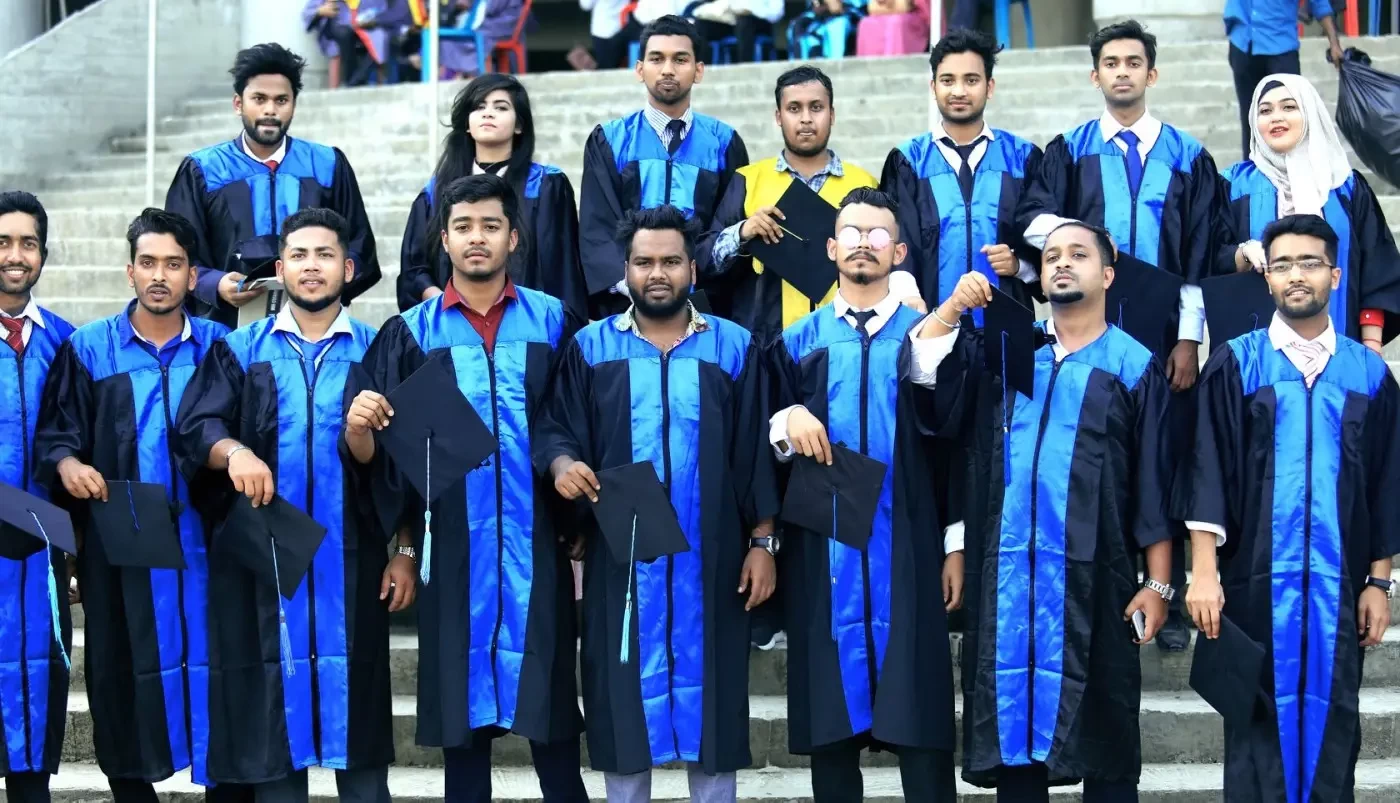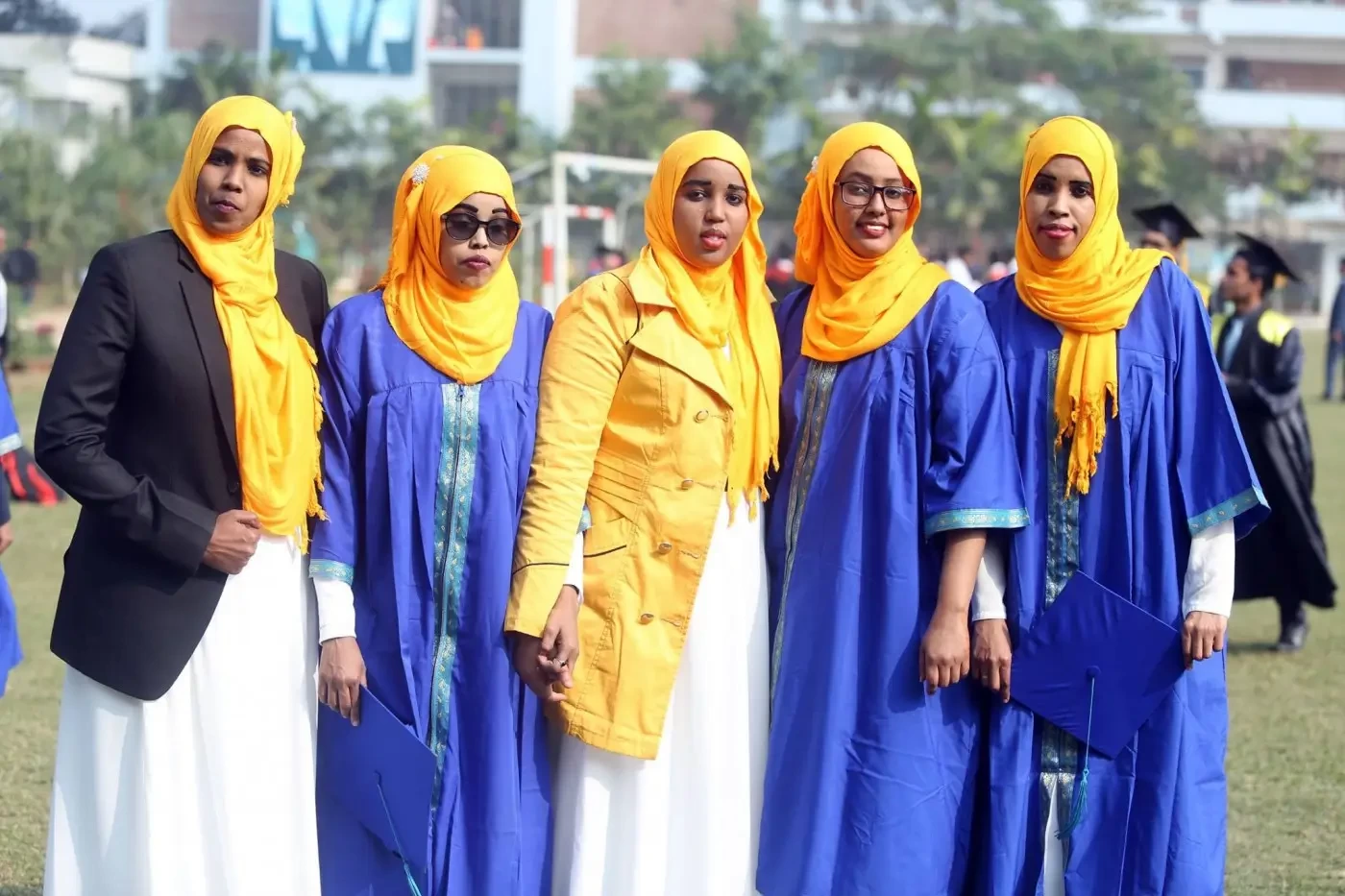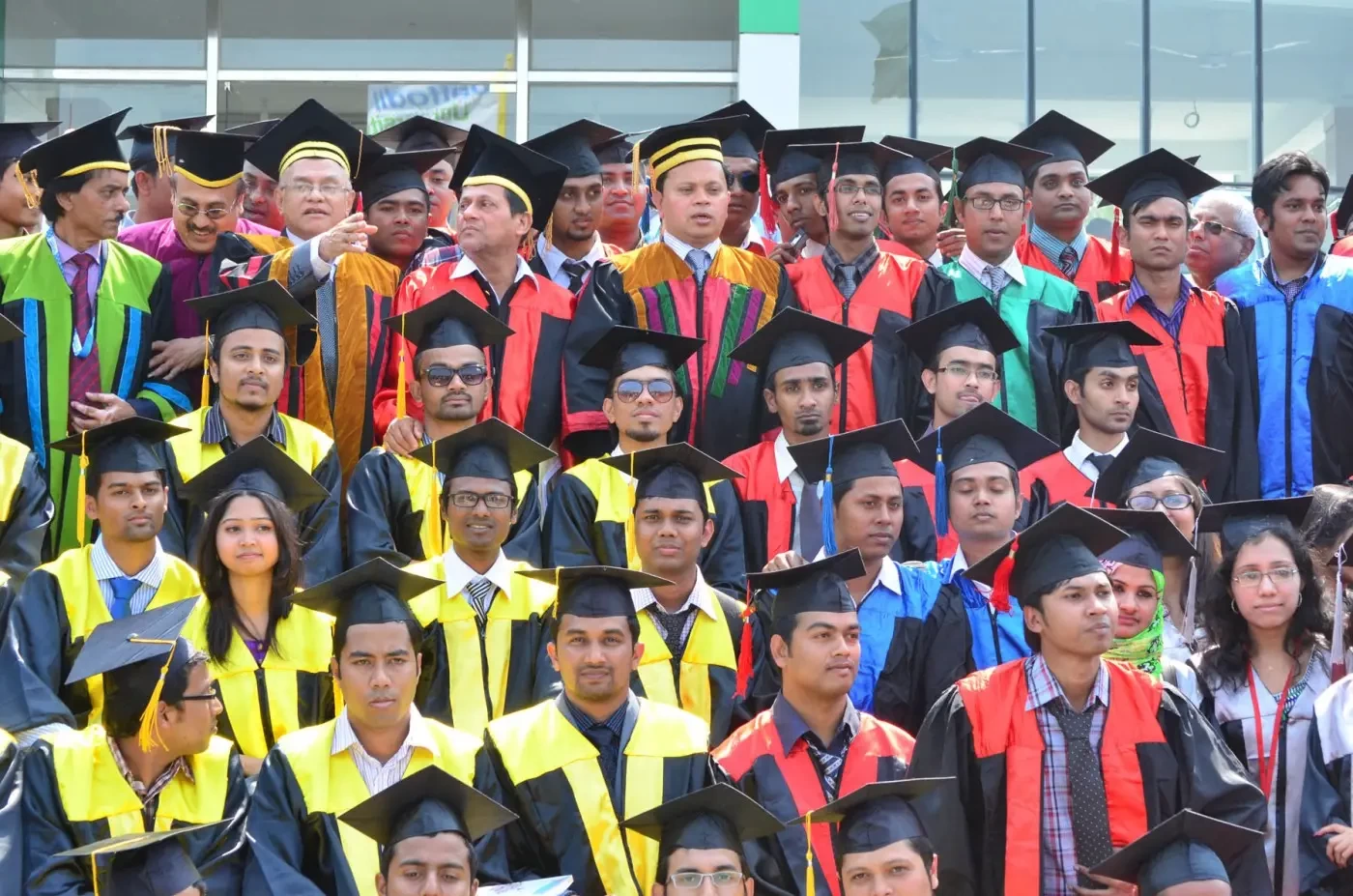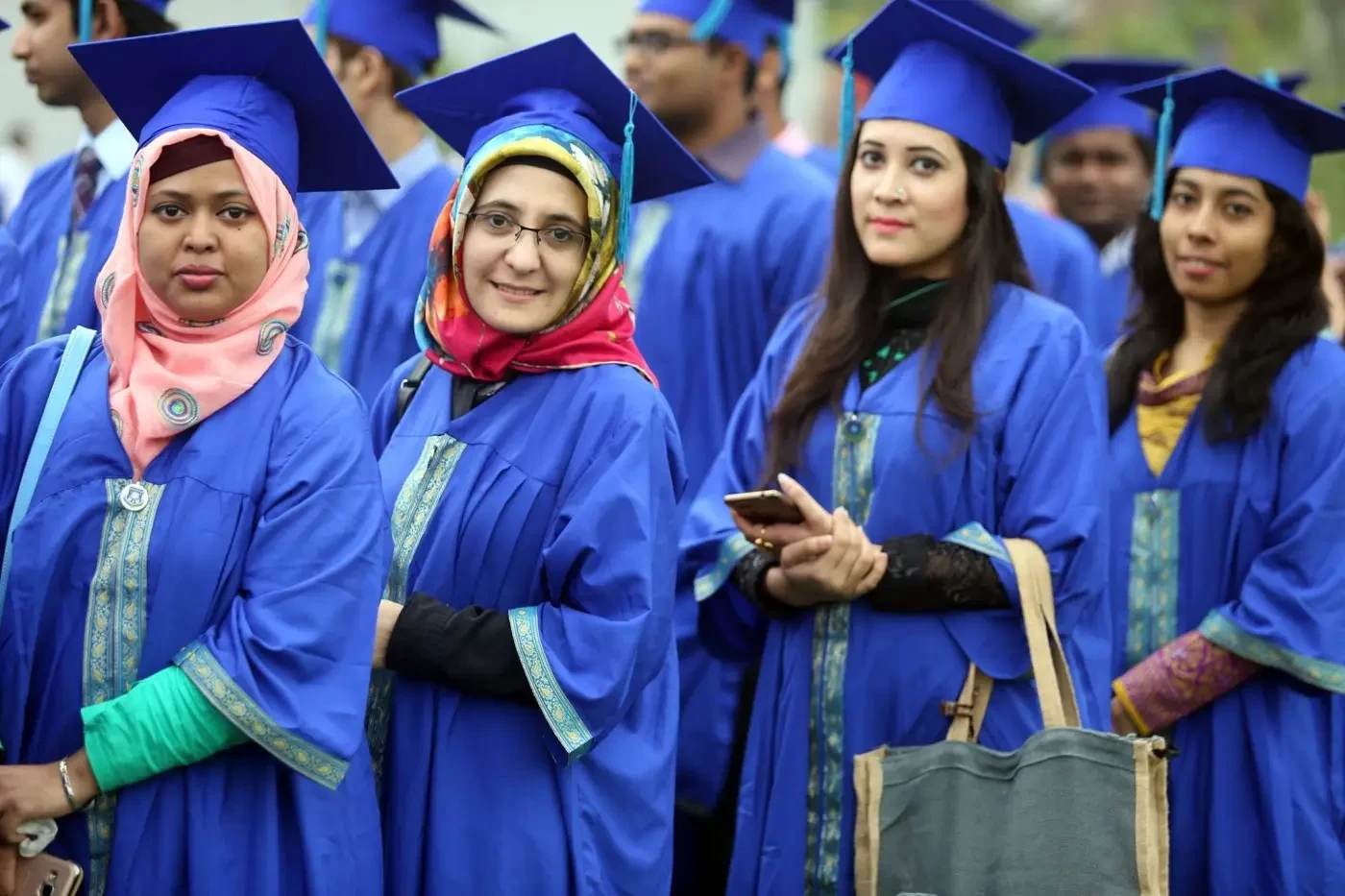Speeches
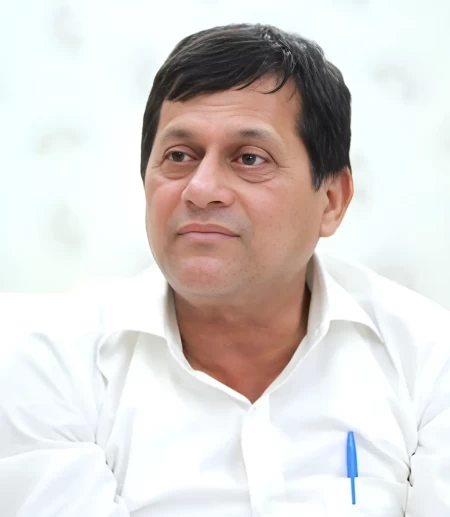
Dr. Achyuta Samanta
Founder, KIIT University and KISS
Member, UGC and NCTE
Speech of Convocation Speaker

Honourable Member of Parliament, Mr. Nurul Islam Nahid, Education Minister Government of the People’s Republic of Bangladesh, Distinguished Chairman, Board of Trustees, Daffodil International University Mr. Md. Sabur Khan, Honourable
Vice- Chancellor of Daffodil International University, Professor Dr. Lutfar Rahman, Learned faculty members of DIU, Distinguished academicians, galaxy of luminaries on and off the dais, ladies and gentlemen and the last but not the least, the stars of today’s celebration, the graduates.
Namskar and a very Good morning to everyone present here.
I am, indeed, privileged and honoured to be invited to this great institution that has all the potential of becoming one of the most sought after educational hubs of Asia.
I am, indeed, overwhelmed by seeing this congregation of young people in the young institution of a young nation who will be going out to serve the world with the knowledge they acquired here.
Ladies and gentlemen, the very name Daffodil reminds me the immortal lines of Wordsworth, where he finds thousands of golden Daffodils dancing in the breeze, tossing their heads in sprightly dance. The waves beside them danced; but they
Out-did the sparkling waves in glee. I see here thousands of young children as beautiful as the golden Daffodils waiting to receive their Degrees.
When DIU’s Chairman Mr. Sabur Khan invited me to deliver the convocation address, I did not know what a lesser mortal like me will speak before a learned audience. Without a second thought I agreed because the Rector of KIIT University who came here earlier said very high of DIU and its teachers, he interacted with. There is another reason for me to come to DIU because it has prioritized technology to be at the forefront at each step of its functional mechanism as an institution. Besides, DIU shares our vision, ‘To create an advanced centre of professional learning of international standards where knowledge and excellence shall be relentlessly pursued, unfettered by the barriers of nationality, language, cultural plurality and religion.” When I met Mr. Khan, I was moved by the way he explained his vision in making DIU a world class institution. I have also a liking for Bangladesh because it is not an alien country for me. It was my country and we are in fact brothers and sisters, but the geo-political compulsions have separated us. We have common history, common values and common cultural heritage. We are perhaps the only two nations in the world whose National Anthems are composed by one great poet Rabindranath. We are in fact similar in every respect. Though India has now graduated from a developing nation to a developed one, my state Odisha continues to remain poor but rich in Human Resources like Bangladesh. I will not discuss why we have remained poor but I am here to share with the distinguished audience how to turn poverty an effective tool to fight it out.
Ladies and Gentlemen, Before I speaking anything to this august audience, I would like to make it very clear that I have not come here to preach any sermons but to share my experience and convey my good wishes to all the students passing out from this University. Convocation is an annual affair in every University and this day the University look back with pride that it has prepared a batch of its students with all the skill and training to work for the society at large. On this day, the University thrusts upon the young graduates enormous responsibility, a responsibility which they cannot shrug off.
Each one of us would agree that there has been rapid changes in every field and the world is virtually under the grip of the most powerful economic order. Economic power now determines almost everything. With the growth of IT, the education scenario is also fast changing. ICT revolution has changed the way world behaves and thinks today. Internet has taken over the class work and teachings in the class room. But traditional Universities still continue with interactive class room. This helps in developing a bond between the student and teachers. Human values and emotions have also changed due to globalization and liberalization. Higher Education is a global business, a trillion dollar business. In 2009-10 alone, foreign students contributed nearly 18.78 billion (1878 crore $) to the US economy. Similarly in UK, it was around 500 crore pound sterling. Many companies are now venturing out to start Universities. With more and more business houses jumping into business of Higher Education, the question that comes to mind, ‘Is higher education a marketable commodity or a consumer good’.
Academic community in general do not agree to this, though governments in developing nations view it as an opportunity to expand their edu-business. It is true that economically a country gains by making University education commercialized but we still believe that Universities must incorporate values and ethics in the curriculum. Each one of us has a social responsibility and education must prepare us for our responsibilities.
What should be the responsibility? The answer lies within us. We all are fortunate that God has been every kind to us. Our parents have sent us to the Universities but have we ever thought of the people living beyond our civilization. Have we ever thought of giving them something to lead a better life. All these thoughts might seem ridiculous in the beginning, but we all can do it.
I would like to share my experience with you. I lost my father when I was only 4 years old. With great difficulties my mother raised me working in peoples house with my seven brothers and sisters. Sometimes I had to sleep without food. With acute poverty, I grew most of the time with only rice gruel, to till my stomach. Walking almost 8 KM to the school, I completed my school, then college with the scholarship. In the College, I had to give tuition to keep money to get admission in M.Sc in Utkal University. I got the job of a lecturer in a city college after the study. I could have enjoyed life thereafter. I had money to spend but I saved some and barrowed some from my friends. With only Rs. 5000/- in my pocket, I left the job to start a technical institute in a rented room with only 12 students in 1992. The same institute has now grown into one of the finest multi-disciplinary Universities of the world. This KIIT University offers, graduation, Post Graduation and Ph. D programmes in several branches of Engineering, Medical Sciences, Dentistry, Bio-Technology, Law, Management, Fashion Technology, Sculpture & Art, Humanities etc. More than 500 students from 20 countries including Bangladesh are studying here. It has been ranked 5th in India with bilateral relationship with 70 Universities across the globe. I must share with you that 4 (Four) Bangladeshi students of KIIT were sent abroad to study M. Tech with full scholarship. Despite being a great University, we take pride not for the University but for Kalinga Institute of Social Sciences which takes care of 20,000 poorest of the poor tribal children. We give them food, accommodation, health-care and education from Kinder Garten to Post Graduation absolutely free. It started simultaneously with KIIT in 1993 and now it has been the largest free residential institute of the world. It is a protégé of KIIT and that exactly what we cherish as our social responsibility.
This social responsibility, I am speaking about, is related to what I believe is the
Art of Giving. In this materialistic world, every one aspires to have more, better and bigger houses, comfort and luxury which money can buy, but most of us never ever think of the person on the street dying in hunger because we have preferred living in denial of the distressing. The sight of grimy bodies in tattered clothes approaching us at a traffic signal makes most of us squirm. Many toss a few coins towards them. Drop a coin and move on. This has been the most general attitude towards giving. This is how most of us like to do by way of charity. Most of us walk past the countless outstretched palms on the street to enjoy our lunch or dinner in a cosy restaurant without even thinking of millions who go hungry, live without a means to earn a livelihood, fight distress with the comfort of medical care. We live in denial of that world, for which we do not want to see beyond our world. Anything beyond our world does not exist for us.
There are few philanthropists in the world like Michael Rubens Bloomberg or Warren Edward Buffet, Henry Ford, Bill Gates, John Hopkins, John Davison Rockefeller, Sir Li Ka Shing and Azim Premji who first established themselves in their respective fields, then started thinking of serving the society. But for me charity was natural. Altruism and generosity always make me happy, for I experienced what life means without a secure home, a steady income and an empty stomach. I fully endorse what George Eliot said, One must be poor to know the luxury of giving.
Charity is an important tenet in very religion, because compassion is essential for spiritual life. In Indian scriptures ‘Daan’ or charity occupies a very prominent place. Hindu mythology is full of stories of great charity, sacrifice and donation made for the welfare of the society at large. Helping those in need is literally the essence of daan. It could be giving food to one who is hungry or teaching someone the Vedas were considered to be the best ‘daan’ given to anybody. When a hungry man comes to one’s door, he comes as a guest considered to be a ‘deva’ or God. In India there are many stories where a poor family prefers to starve but never ever turns away a beggar. Glimpses of such a trait still can be found in every Odia household. Odisha, despite being poor, can be best example of charity. Each household in Odisha cook some extra rice anticipating any guest or a beggar to whom it could be fed. If someone comes, the rice is served or it is kept with water filled in it so that it does not get destroyed and the same, known as ‘Pakhal’ – wet rice, is consumed the next day. These traditions still continues and no wonder that it has become a cultural trait for Odisha.
Religious scriptures speak about charity to be done for upliftment of humanity. It is considered to be sensitive to human sufferings and social injustice and it is aimed to promote social service, global brotherhood and respect the values of humanity. While epics like Mahabharata speaks of Karna, who even gave his shield and the earrings which could have protected him from death. In the Mahabharata there are elaborate instruction on philanthropy (Daan). Through knowledge and understanding , one can develop purity and feelings of right achievements. Shankaracharya , in the 8th century spoke of danam sam vibhagah, meaning right distribution of resources. Ramayan speaks of Rama abdicating the throne in favour of Bharat. Puranas speak of saint Dadhicni who donated his bones to make the weapon to kill demon Vruttasura. Dharmasutras have elaborate description of charity. In all the writings the philanthropic principles are highlighted.
In Islam, charity is held in high esteem. While Zakat is considered to be a person’s moral obligation to the society, Sadaqa covers all forms of charity. Quran defines the scope in such a vast way that even the poor who can have nothing tangible to give can offer sadaqa in shape of a smile or a glass of water to the thirsty or even speak some kind words.
Giving is essential to Buddhisim too. Giving in Buddhism includes charity or giving material help to people in need. The Sutta Pitaka lists a number of motivations for giving. The practice of giving is universally recognized as one of the most basic human virtues, a quality that testifies to the depth of one’s humanity and one’s capacity for self-transcendence. Daan Paramita in Buddhism is perfection of generosity. A generous spirit is about more than just giving to charity.It is a spirit of responding to the world. Buddha’s life is considered to be a symbol of sacrifice.Dalai Lama believes that “Being kind, attentive and honest in dealing with others, offering praises where it is due, giving comfort and advice where needed and simply sharing time with some one – all these are forms of generosity and they do not require any particular level of material wealth”.
Similarly Dana or Danavrata constitutes the fourth vow of spiritual discipline for any layman in Jainism. It requires even the lay follower to perform charity by offering food, saving lives of others in danger, distributing medicine and spreading knowledge. In Jainism, these four great acts of charity, ‘Chaturvidha Daan’ are considered to be four gifts to Human Rights which even today many aid agencies and charitable organizations are intrinsically linked with.
The term charity has also similar connotation in Judaism. Tzedakah literally meaning righteousness is used to signify charity. The concept of charity is virtually non-existent in Jewish tradition, because when a Jew contributes money, time and resources to the needy, he is not considered as generous, benevolent , rather it is considered his duty of doing what is right and just. A Jew is said to keep ten percent of his income for the people in need.
Christianity does not believe Charity as an optional extra, rather an essential component of faith. The early saints of the Church had a very radical view of charity. They believed that what God has given generously and freely is ‘stolen’ by those who hoard their wealth instead of sharing with those in need. In Matthew’s Gospel, Jesus identifies himself with the poor and teaches that everybody would be judged not on how beautiful our altars are but on the way how we treat others. Charity for Christians is considered to be a vibrant expression of love.
Zoroastrianism considers poverty and suffering as an affliction of evil; hence it is the duty of every individual to fight this evil. Christ asked his followers to love their neighbours, Zarathustra asked his followers to attain happiness by making others happy. In the prayer the Zoroastrian child learns’ Yatha Ahu Vairo, which says he who gives assistance to the poor acknowledges the kingdom of God.
Every religion and every religious teacher uphold the philosophy of giving, but giving material goods is just one form of generosity. One can always extend an attitude of generosity into one’s behaviour. That is why we must think and follow what the great scriptures of religion say. For us giving should not just donating money. It should mean giving a little bit of our own self to help others in need. “Happiness dose not result from what we get, but from what we give”.
I would like to share with you one more thing which I am sure would make you all happy. The chairman of DIU visited KIIT and its protégé KISS. He was moved by seeing the 20,000 poorest of the poor tribal children getting everything to pursue their study from KG to PG. As a pious soul and true believer of Allah, he came up with the proposal for setting up a branch of KISS in Dhaka Bangladesh. He even announced to donate 2 acres of land adjacent to the new campus for establishing KISS – Bangladesh, where we would be working together. It is indeed a bright example of the Art of Giving.
Ladies and Gentlemen, though Chairman Mr. Sabur Khan Saheb informed about his desire when he visited us, yet I am informing it today to the world, because this day is a very important day in the history of the world. This day, way back in 1876, the first ever telephonic transmission by Alexander Graham Bell said, ‘Come here, I want you’ which was transmitted by the telephone, just like the way Chairman Sabur Khan told me, Come here I want you. Today the world asks you my young friends, the same thing, COME HERE I WANT YOU. This day in 1890, the world came together for a cause. The First Olympic game started to unite the nations through sports. Again on this day the greatest Renaissance Artist Michelangelo was born in 1475. There could not have been a better beginning for the young graduates who are now equipped with the knowledge given to them by their University. Once out in the world outside the class room, please remember the inspiring words of Bangabandhu Shaikh Mujibur Rahman who told a mammoth crowd of 2 million people in the Ramna Race Course Maidan just a day after, that is on 7th March in 1971, Ebarer Sangram Amader Muktir Sangram, Ebarer Sangram Amader Svadhinatar sangram, I have the same words for you, Your struggle is for your liberation from hunger and ignorance. Your struggle is for your Independence from poverty and illiteracy. Go out to conquer the world and use your knowledge in serving the society. Think of your fellowmen and follow the Art of Giving.
Once again congratulating you, I thank everyone for giving me a patient hearing.
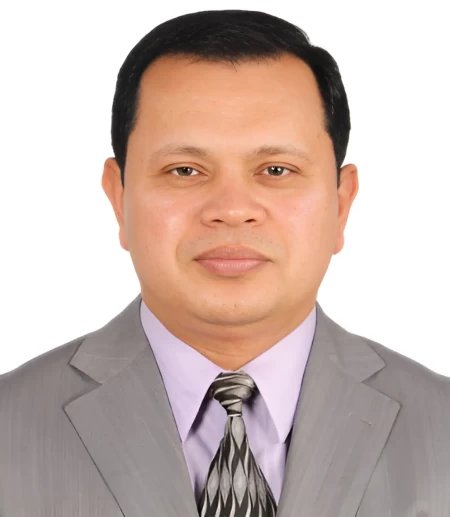
Md. Sabur Khan
Chairman, Board of Trustees
Daffodil International University
Speech of the Chairman (BoT)

Bismillahir Rahmanir Rahim . In the name of Almighty Allah- The most Benevolent and Merciful.
Mr. Nurul Islam Nahid MP, Honorable Minister of Education of the Government of the People’s Republic of Bangladesh and President of Convocation Ceremony; Dr. Achyuta Samanta, the Convocation Speaker; Honorable Members of Parliament, Chairman and members of the University Grants Commission; Professor Dr. M. Lutfar Rahman, Vice Chancellor of Daffodil International University; Heads and Representatives of diplomatic missions, Members of the Trustee Board, Syndicate and Academic Council of the university, Deans of Faculties, Alumni of the university, representatives of print and electronic media, teachers and staff of the university, graduating students, ladies and gentlemen: Assalamo Alaiqum and a very good morning to you all. It’s a great pleasure for me to be able to welcome you at the 4th convocation on behalf of the university authority.
First of all, with deep respect, let me pay homage to the martyrs of the language movement of 1952 and those of our War of Liberation of 1971. It is due to their ultimate sacrifice we have got the right to self-rule in the independent sovereign Bangladesh.
Dear Graduating Students
This convocation day is your day; this day is the day of the recognition of your achievement; this elegant event is the event for celebration of your success. You worked hard for years; you dedicated your energy and time to make the best use of your potential; you have achieved up to the satisfaction of the university and up to the expectation of your family. I congratulate you and your family from the bottom of my heart.
Ladies and Gentlemen
No one can contribute to the best of their ability in their professional life without knowledge and skills acquired through technology-oriented curricula designed in accordance with the needs of our life in the 21st century. Daffodil International University has embarked upon a master plan to provide its students with a curriculum appropriate to the present age. This modern curriculum has provisions for an appropriate use of educational technology both for the students and for the teachers.
The curriculum in line with our practical needs and aspirations ensures industrial linkage, self-skills for the students and career development opportunities. Daffodil is committed to transform our huge population into potential human resources. We accomplish this through many necessary policies including equal opportunities for men and women, and for the gifted and those with disabilities while recruiting for admission and employment. This is our commitment.
We, as a university, aspire to be the best of the best in the country without compromising quality and standard. We want to ensure our continuity through imparting industry-oriented education with a flare of technology so that our graduates are skilled and competent to compete in the globalised market of the 21st century. We have been doing this for the last 12 years. We have done this through production of at least eight thousand graduates over this rather short period of time; our graduates have already made their marks in the job market at home and abroad.
Daffodil International University is fully digitized. The policies of this university are fully compatible with the programs of Digital Bangladesh and the Vision 2021 of the Government of Bangladesh.
Respected Guests
In order to achieve our goals we have been implementing our project, “One Student One Laptop.” You will be happy to know that more than seven thousand Daffodil students use laptops regularly for their educational purposes. We distribute thousands of laptops free of cost to the students every year under this project. Moreover, our students use provisions of Forum, Blog, On-Line Library, Learning Feedback System, Teaching Evaluation, Campus Radio, Wi-Fi Network, and our own ISP and have established themselves in different prestigious positions in their professions at home and abroad. Memberships of International Association of Universities and IEB have enriched the credibility of Daffodil International University to a great extent. Our achievement in international ranking has been acknowledged by organizations like Alexa and Webometrics. Our regular participation in the Asian University Presidents Forum (AUPF) has strongly ensured our place as a university in the world of education internationally. Our achievements include organization of international
conference on teaching and learning and ACM ICPC Regional Computer Programming Contest. We have four Research Centers of our own. We have provisions for credit transfer facilities. We have started joint Ph.D. programs with a few foreign universities. We have established academic linkage and MoU with more than a hundred internationally reputed universities. Our record of recognition and affiliation from different world organizations has been instrumental in attracting many foreign students to take up courses at Daffodil International University. We have students from at least ten foreign countries and the number of foreign students is growing gradually. We help our students acquire multicultural adaptability through Summer Camps where students from different countries avail opportunities of exchanging ideas and views for mutual understanding and academic friendship.
Ladies and Gentlemen
You would be pleased to know that we have, to our credit, a lot of national and international awards for our contribution to education and that includes Asia’s Best Business School Award, Amity Global Academic Award, Golden Star Academic & Educational Excellence Award, Asia’s Most Inspiring Nation Builder Award, and World Quality Commitment Award etc.
Our provisions for human resources development through HRDI, jobsbd.com, Directorate of Students Affairs, Alumni Association, Personal Counseling etc. are well used by the students and teachers at Daffodil for their Continued Professional Development (CPD) and further their career. As a result, we already have members of our alumni in lucrative positions like top executives in the job market of Bangladesh and other countries. These efforts are supplemented by provisions for acquiring life-skills through programs implemented by Air Rover Scout, different Intra and Inter-university contests, and participation in national level sports competition, Programming Contests, Debate, Science Fair, International Scientific and educational conferences. Acknowledgements from within and outside Bangladesh show that Daffodil has transformed into a unique and an extraordinary quality education provider of the country in a relatively short period of only 12 years.
My Dear Students
You are the ambassadors for this university. You are our future. Your success is our success. We want to see you as leaders of quality and achievements in your professional life. Daffodil is promised to be with you at all phases of your future. I firmly believe that you would continue keeping your emotional and academic link with Daffodil for your whole life. Let us vow today, we together, in spite of many obstacles and limitations, will try our best to carry the high flying flag of Daffodil with flying colors well into the 21st century and beyond.
Respected Guests, Students, Ladies and Gentlemen
We have already started different academic programs with infrastructural facilities for students and teachers at the lush green, idyllic and serene but modern environment of our permanent campus on a forty-acre of land at Ashulia Model Town in Dhaka. The ambitious master-plan for this beautiful permanent campus ensures separate academic buildings, roof-top swimming pool, international house, multipurpose tower, IT center etc. spreading over a sixty-acre of land when completed.
With a modern conference hall, VIP rooms etc accommodated in the elegant entrance of the permanent campus of Daffodil are the artistic and architectural features that visitors, one day, will crowd to enjoy the beauty. Other important features of this campus include laboratory, a huge library, wide open grounds for games and sports, indoor and outdoor games facilities including chess, volleyball, badminton, tennis; sufficient number of classrooms, a large auditorium, medical center, cafeteria, gymnasium, canteen and a Martyrs Monument (Shoheed Minar). This permanent campus with its security and other necessary provisions are an attraction for the students and their families, which is an encouragement for us as an authority. We plan to house at least three thousand students in this campus by 2016. We are sure that the number of students at the permanent campus will surpass the number of students at the city campus by 2018.
Ladies and Gentlemen
We believe actions speak louder than words. We aspire to prove that with all the facilities and provisions we already have and the healthy academic atmosphere we have been able to create through our hard-working students under the guidance of many inspiring teachers of international repute, we will be a university with international credibility very soon.
I appreciate the friendly and talented teachers and hard-working support staff who always give their best to lead the university towards a glorious goal. We cater for the talented, the physically challenged and, under this policy, about three thousand students have been enjoying scholarships in furtherance of their study and future career. I hope one day, and that day is not far away, we will establish Daffodil as an ideal university in all respects. I acknowledge the contributions of all for their selfless efforts in taking this university from success to yet another success continuously.
Invited Guests and Ladies and Gentlemen
Finally, I would like to reiterate that we have been educating and training a new generation of human resources equipped with appropriate skills, knowledge and expertise in order for them to be able to contribute effectively in the socio-economic developments and other nation-building programs of Bangladesh. Through technology and innovation and courses like Art of Living and Art of Giving, Synergy, we are committed to prepare a new breed of workforce with useful knowledge, appropriate skills, positive attitude and conscience, morality and patriotism. Let us work together with commitment and dedication; let all of us work with love and loyalty for Daffodil; let us not only work but also enjoy the work that we do. We will, Insha’Allah, reach our glorious goal one day, and let us believe that that day is not far away.
Thank you all for your kind listening to this rather long speech. May Allah bless you all.
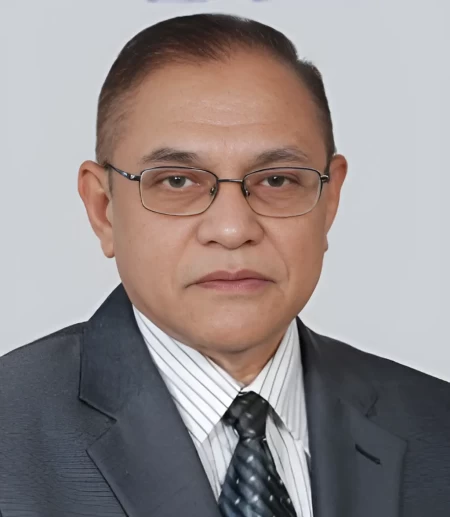
Professor Dr. M. Lutfar Rahman
Vice Chancellor
Daffodil International University
Speech of Vice Chancellor

In the name of Almighty - The loving, The Kind.
Honorable Minister of Education, People’s Republic of Bangladesh, Mr. Nurul Islam Nahid, MP, the President of the Convocation Ceremony,
Respected Convocation Speaker, Dr. Achyuta Samanta, an internationally acknowledged social reformer, and founder of Kalinga Institute of Social Sciences (KISS) and many other prestigious institutions of India,
Honorable Members of Parliament, Honorable members of UGC, Vice Chancellors, Heads and representatives of Diplomatic Missions, Chairman of Board of Trustees of Daffodil International University, Mr. Md. Sabur Khan, Emeritus Professor and founding Vice Chancellor of the university, Dr. Aminul Islam, Members of Board of Trustees, Syndicate and Academic Council, Deans of Faculties, Daffodil International University Alumni, Members of print and electronic media, Faculty members, Graduating students, Ladies and Gentlemen: Regards, Salam, Namasker and a very good morning to you all.
On behalf of Daffodil International University, I have the pleasure to welcome you all in the 4th Convocation at this wide-open Permanent Campus of the university at Ashulia in Dhaka. Your presence and participation in the convocation have made the event very decorous, distinguished and dignified.
On this auspicious occasion, I heartily congratulate the graduating students of the 4th Convocation of Daffodil International University. I would also congratulate their parents, relatives and well-wishers for the sacrifice and support that they have rendered for them.
We are grateful to Honorable Convocation Speaker, Dr. Achyuta Samanta, who has delivered the convocation speech. Dr. Samanta is the founder of Kalinga Institute of Social Sciences (KISS), Kalinga Institute of Industrial Technology University (KIIT University), Kalinga Institute of Medical Sciences (KIMS) and many other reputed institutions in Odisha in India. He has a long and praiseworthy record of not only empowering the marginalized and impoverished sections of the society of India through education, employment and healthcare, but also supporting similar sections of people in other parts of the world. We express our heartfelt gratitude to Dr. Achyuta Samanta.
Dear graduating students, your respected teachers are present here to celebrate your success. The teachers have been your friends, philosophers and guides all through your learning years at the university. They are the pride and pillars of this university. I believe you all will remember their contributions with gratitude and dignity.
Daffodil International University started its journey in January 2002. Within a short period of only 12 years, we have more than 12,000 students, about 450 teachers, and nearly 500 officers and staff. Academic programs of the university are organized under five faculties and over 30 bachelors and masters programs are conducted in the university. Life at the vibrant campuses of the university is exciting and stimulating, but it is challenging at the same time.
The university provides quality education at moderate cost. The main objective of the university is to turn out broadly educated and technologically oriented graduates capable of attaining meaningful career and making positive contributions for the development of the nation. Every student is groomed up to be an effective citizen with proper manner, ethics and lifestyle. Our mission is to turn out best graduates for the society.
In line with Vision 2021 and Digital Bangladesh, almost all academic and administrative services of the university have been digitized and the university has emerged as one of the prominent ICT oriented universities of the country.
Daffodil prides itself for its four research centers, four research journals of international standard and two institutes for education and research in human resource developments and language studies. We regularly hold national and international conferences, seminars and workshops on contemporary issues.
Daffodil International University maintains a wide spectrum of co-curricular and extra-curricular activities for the students. The students participate in sports, scouting, cultural programs, debates, literary competitions, etc, in inter-university, national and international competitions. The university provides facilities for professional certification of a number of professional institutes like Microsoft IT Academy, CISCO Networking, Oracle Academy, etc. The university also provides part-time and casual employment opportunities for the students. The students take part in numerous events as a part of academic social responsibilities of the university.
The university maintains academic collaborations with nearly hundred renowned universities and organizations of the world. We conduct joint research programs leading to PhD degrees for young teachers with a number of foreign universities. We have over 100 international students from America, Europe, Africa and Asia.
Use of ICT for administrative, teaching, learning and research activities are parts of present lifestyle and Daffodil International University made significant progress in such areas. Students are provided with broadband Internet and on-campus WiFi facilities and dedicated Internet browsing laboratories. They are provided with laptops free of cost. The Website of the university is very rich and it provides all academic and administrative information of the university. We established Campus Radio, and Campus TV will be introduced in future. Daffodil International University can boast of the best platform for e-education in the country.
The university conducts academic programs from three elegant campuses at Dhanmondi, Uttara and Ashulia in Dhaka city. Developments of Ashulia Permanent Campus are progressing fast on a land of about 40-acre. The facilities at the permanent campus include the elegant entrance, academic buildings, students’ hostels, guest house, sports facilities with vast playgrounds. Efforts are underway to double the land area of this permanent campus. When fully completed, over twenty five thousand students, as well as teachers, officials and associated supporting staff will be accommodated in the campus.
A few words for the new graduates. Graduation from the university has enhanced your respect and dignity; it has increased your responsibility at the same time. You will use your knowledge and skills, experience and expertise to build up “Sonar Bangla”, that is Golden Bengal, which we all dream. Please do not forget that humanity and patriotism should be your guiding principles. Today we live in a knowledge-based society; the importance of knowledge in today’s life is more than physical wealth. You will continue learning every day to survive, sustain and succeed in life. Please do not forget that self-learning and life-long learning are the keys to success.
On behalf of the management of Daffodil International University and respected colleagues, I express our gratitude to Mr. Md. Sabur Khan, Honorable Chairman, Board of Trustees and Chairman, Daffodil Group, a great visionary, and other members of Board of Trustees for inspiration and guidance for the university.
I would like to conclude with yet another round of best wishes to the new graduates. I wish them glorious success with bright future.
We express our gratitude to Honorable Minister and Honorable Convocation Speaker. Thank you, Mr. Nurul Islam Nahid, MP, Honorable Minister and the President of the Convocation Ceremony. Thank you, Distinguished Convocation Speaker, Dr. Achyuta Samanta, for your time and visionary speech. We will gratefully remember you and your presence at our campus in the years to come. Let Almighty bless you with peaceful and long life.
Thank you dignitaries, thank you ladies and gentlemen. Thank you all.
